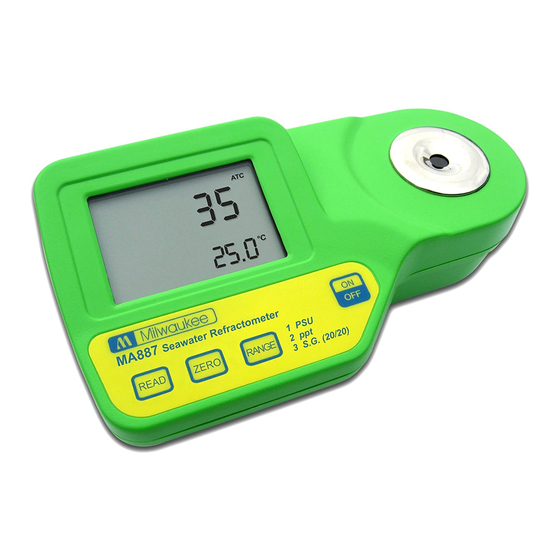Table of Contents
Advertisement
Test Equipment Depot - 800.517.8431 - 99 Washington Street Melrose, MA 02176
INSTRUCTION MANUAL
MA887
Refractometer for Seawater
Refractometer for Seawater
Refractometer for Seawater
Refractometer for Seawater
Refractometer for Seawater
Measurements
Measurements
Measurements
Measurements
Measurements
TestEquipmentDepot.com
Milwaukee Refractometer
Milwaukee Refractometer
Milwaukee Refractometer
Milwaukee Refractometer
Milwaukee Refractometer
1
Advertisement
Table of Contents

Subscribe to Our Youtube Channel
Summary of Contents for Milwaukee MA887
- Page 1 Test Equipment Depot - 800.517.8431 - 99 Washington Street Melrose, MA 02176 TestEquipmentDepot.com INSTRUCTION MANUAL Milwaukee Refractometer Milwaukee Refractometer Milwaukee Refractometer Milwaukee Refractometer Milwaukee Refractometer MA887 Refractometer for Seawater Refractometer for Seawater Refractometer for Seawater Refractometer for Seawater Refractometer for Seawater...
-
Page 2: Table Of Contents
Instruction Manual MA887 Refractometer for Seawater Measurements TABLE OF CONTENTS FUNCTIONAL DESCRIPTION ................3 GENERAL DESCRIPTION ..................5 SPECIFICATIONS ....................6 PRINCIPLE OF OPERATION ................6 MEASUREMENT GUIDELINES ................8 CALIBRATION PROCEDURE ................8 MEASUREMENT PROCEDURE ................10 CHANGING MEASUREMENT UNIT ..............11 CHANGING TEMPERATURE UNIT .............. -
Page 3: Functional Description
FUNCTIONAL DESCRIPTION DISPLAY DISPLAY DISPLAY DISPLAY DISPLAY A. BATTERY STATUS ICON (BLINKS WHEN LOW BATTERY CONDITION DETECTED) B. MEASUREMENT IN PROGRESS TAG C. SETUP: FACTORY CALIBRATION TAG D. CAL: CALIBRATION TAG AUTOMATIC TEMPERATURE COMPENSATION (BLINKS WHEN TEMPERATURE EXCEEDS 10-40 °C / 50-104 °F RANGE) PRIMARY DISPLAY (DISPLAYS MEASUREMENT AND ERROR MESSAGES) G. - Page 4 Instruction Manual MA887 Refractometer for Seawater Measurements FRONT PANEL FRONT PANEL FRONT PANEL FRONT PANEL FRONT PANEL A. LIQUID CRYSTAL DISPLAY (LCD) B. READ KEY (USER MEASUREMENT) C. ZERO KEY (USER CALIBRATION) D. RANGE KEY (USER MEASUREMENT UNIT) ON/OFF STAINLESS STEEL SAMPLE WELL AND PRISM G.
-
Page 5: General Description
The MA887 refractometer is an optical device that is simple and quick to use. Samples are measured after a simple user calibration with distilled or deionized water. Within seconds, the refractive index and temperature are measured and converted into one of three popular measurement units;... -
Page 6: Specifications
Instruction Manual MA887 Refractometer for Seawater Measurements SPECIFICATIONS ° ° ( ° ° ° ° ± ± ± ± ° ± ° Light Source Yellow LED Measurement Time Approximately 1.5 seconds 100 μL (cover prism totally) Minimum Sample Volume Sample Cell... - Page 7 In the MA887 refractometer, light from an LED passes through a prism in contact with the sample. An image sensor determines the critical angle at which the light is no longer refracted through the sample. Specialized algorithms then apply temperature compensation to the measurement and convert the refractive index to: PSU (Practical Salinity Units), ppt (part per thousand) or S.G.
-
Page 8: Measurement Guidelines
Instruction Manual MA887 Refractometer for Seawater Measurements Specific Gravity (20/20) ia based upon the published relationship between density at 20 °C and the mass of dissolved salts in the seawater sample (CRC Handbook of Chemistry and Physics, 87 )Edition). MEASUREMENT GUIDELINES •... - Page 9 2. Using a plastic pipette, fill the sample well with distilled or deionized water. Make sure the prism is completely covered. Note: If the ZERO sample is subject to intense light such as sunlight or another strong source, cover the sample well with your hand or other shade during the calibration.
-
Page 10: Measurement Procedure
Instruction Manual MA887 Refractometer for Seawater Measurements MEASUREMENT PROCEDURE Verify the instrument has been calibrated before taking measurements. 1. Wipe off prism surface located at the bottom of the sample well. Make sure the prism and sample well are completely dry. -
Page 11: Changing Measurement Unit
5. Using a plastic pipette, rinse prism and sample well with distilled or deionized water. Wipe dry. The instrument is ready for the next sample. CHANGING MEASUREMENT UNIT Press the RANGE key to select measurement units. The instrument toggles between the three measurement scales each time the key is pressed and the primary display indicates “PSU”, “PPt”... -
Page 12: Changing Temperature Unit
Instruction Manual MA887 Refractometer for Seawater Measurements CHANGING TEMPERATURE UNIT To change the temperature measurement unit from Celsius to Fahrenheit (or vice versa), follow this procedure. 1. Press and hold the ON/OFF key continuously for approximately 8 seconds. The LCD will display the “all segment” screen followed by a screen with the model number on the primary display and the version number on the secondary display. -
Page 13: Error Messages
ERROR MESSAGES l i t l i t ° ° < ° ° ° °... -
Page 14: Battery Replacement
Instruction Manual MA887 Refractometer for Seawater Measurements BATTERY REPLACEMENT To replace the instrument’s battery, follow these steps: • Turn the instrument OFF by pressing the ON/OFF key. • Turn instrument upside down and remove the battery cover by turning it counterclockwise. -
Page 15: Warranty
Damage due to accidents, misuse, tampering or lack of prescribed maintenance is not covered by the warranty. Milwaukee/Martini instruments reserves the right to make improvements in design, construction and appearance of its products without advance notice. - Page 16 THANK YOU FOR CHOOSING MANMA887 10/09 Test Equipment Depot - 800.517.8431 - 99 Washington Street Melrose, MA 02176 TestEquipmentDepot.com...














Need help?
Do you have a question about the MA887 and is the answer not in the manual?
Questions and answers